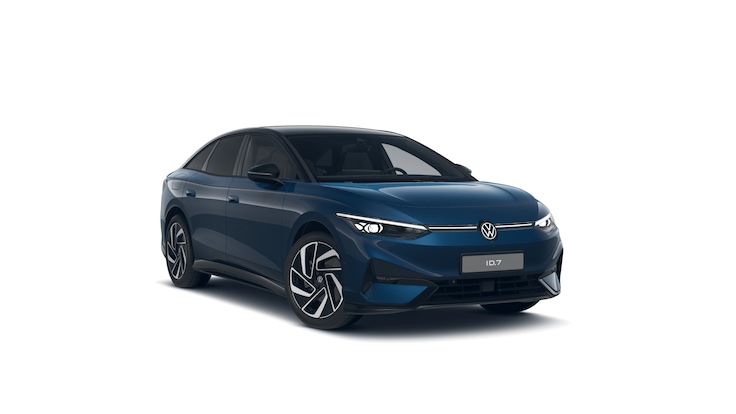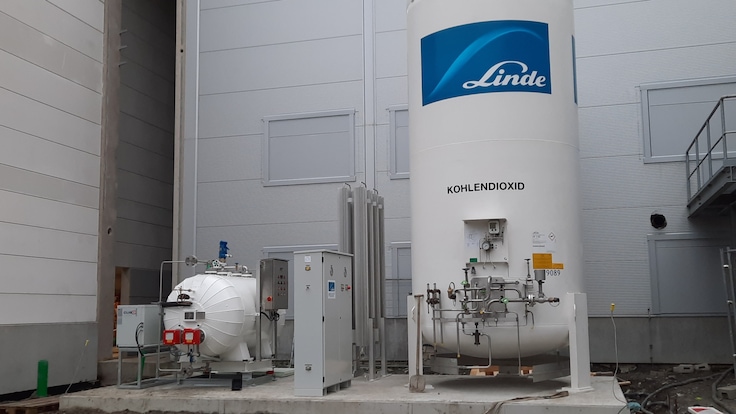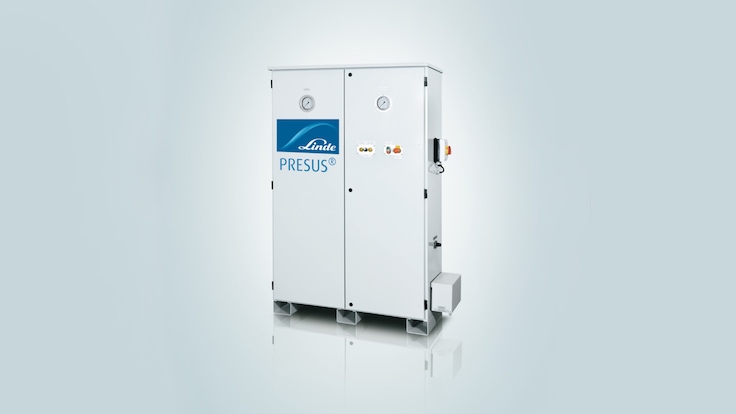
Choose from one of the market's widest ranges of products, including natural refrigerants, along with support services from the Linde team to help you meet your legislative and environmental obligations
As automotive OEMS rethink refrigerants, they can rely on Linde's supply expertise to provide R744 - a more sustainable solution that meets the strictest specifications.

At the height of the summer, stepping into the sweltering heat of a car left soaking up the sun's rays, we reach for the air con and wait for the cool conditioned air to wash over us. Personal comfort is top of mind; the refrigerant used in the air conditioning system is probably not. It is something, however, the automotive industry is increasingly paying attention to. More OEMs are now turning to R744 - a natural refrigerant gas based on CO2 - and Linde's proprietary high-pressure supply solution to fill their BEV cooling systems. Here's why.
The brief history of automotive refrigerants is one characterized by letters and numbers: changing in response to ever tightening regulations amid environmental, safety and toxicity concerns around the substances used. When CFCs (chlorofluorocarbons) were phased out in the 1990s due to their harmful effects on the ozone layer, R134a became the standard replacement. Europe however deemed its Global Warming Potential (GWP) too high still, banning it for vehicles manufactured after 2010 and in all new cars from 2017. That brings us to today's commonly used R1234yf.

While a significant improvement in terms of environmental impact (GWP of less than 4 compared to R134a at 1400), and despite favorable thermodynamic characteristics, this widely employed fluorocarbon still presents challenges. "The historic trend of refrigerants being held to increasingly higher standards and more stringent specifications is bound to continue," says Paolo Kirchpfening, Global Commercialization Manager Manufacturing Markets at Linde. "As mobility gets cleaner through electric vehicles, OEMs are starting to rethink the profiles of substances they choose to use for mobile air conditioning systems or other thermal management like heat pumps."
One drawback of R1234yf is that it is classified in a group of so-called "forever chemicals" - highly persistent, synthetic chemicals which hardly degrade in the natural environment. Per- and polyfluorinated alkyl substances (PFAS) – to use the technical term - have potentially harmful effects not only to nature but to human health: "When released to the atmosphere through leakages for example, R1234yf forms the carcinogenic Trifluoroacetic acid (TFA)," explains Kirchpfening - but that’s just one factor contributing to the rather uncertain future surrounding PFAS regulation in Europe, the US and beyond. There are concerns around this common refrigerant in operation too. "In the event that a vehicle were to catch fire as a result of an accident or battery fault, there is the risk that the cooling agent would form the highly poisonous carbonyl fluoride on combustion," he adds.

Linde's R744 however, is not affected by any such growing restrictions around the use of PFAS. "R744 is a climate-friendly, natural refrigerant gas for automotive air-conditioning systems based on liquid carbon dioxide (LIC)," explains Andreas Praller, Global Commercialization manager plastics and high-pressure applications. It combines zero ozone depletion potential with a very low direct global warming potential. In operation, there is the added advantage that the gas is both non-toxic and non-flammable. And when it comes to performance: "Even at higher temperatures the cooling effect is comparable to R1234yf", says Praller, "and when combined with highly efficient heat pump technology, it even enables a significant extension of the battery electric vehicle’s range."
The reliable operation of R744 for mobile AC systems has already been demonstrated through a pilot project whereby the German Environment Agency (UBA) operated an official car fitted with a CO2 air conditioning system between 2009 and 2017. The measurements taken as part of a research project by the Federal Ministry for Environment confirmed the high performance of CO2 and were verified by the German Automobile Club (ADAC). Commercial deployment is already underway with Volkswagen announcing its plans to convert all battery electric vehicles to R744 by 2030.

With liquid CO2 comes the need for higher pressures in operation, making filling system design that bit more challenging. Luckily, Linde can lean on its extensive experience and expertise in handling both cryogenic refrigeration and specialty gases. "R744 is subject to stringent refrigerant standards as well as automotive regulations that specify strict gas purity levels to avoid risk of corrosion," says Praller. This naturally calls for a standardized filling process for BEV cooling systems. To this end, Linde has teamed up with automotive OEMs and its certified engineering partner Göhler Anlagentechnik to develop a high-pressure LIC supply solution that can be installed directly on an OEM manufacturing site. It's a standardized, skid-mounted design that includes Linde's proprietary PRESUS® pressure booster as well as temperature and pressure conditioning equipment for stable, precise filling.
"Beyond the technical expertise, Linde also has an extensive supply network for CO2," explains Kirchpfening, "This means we can be trusted to meet customers' LIC demands". With more OEMs now recognizing the future-proofing benefits of choosing a safe, climate-friendly refrigerant, that demand is unlikely to cool off any time soon.
Linde and Göhler Anlagentechnik will be showcasing the R744 solution at the ATMOsphere MAC Summit 2024 x TU Berlin - an event dedicated to natural refrigerants for mobile air conditioning and heat pumps on the 12-13 September.
Find out more here: https://atmo.org/events/atmosphere-mac-summit-2024-x-tu-berlin/

Choose from one of the market's widest ranges of products, including natural refrigerants, along with support services from the Linde team to help you meet your legislative and environmental obligations

As the plastics industry bends back into shape, Linde's PLASTINUM® CO2 portfolio helps customers inject some serious productivity gains.